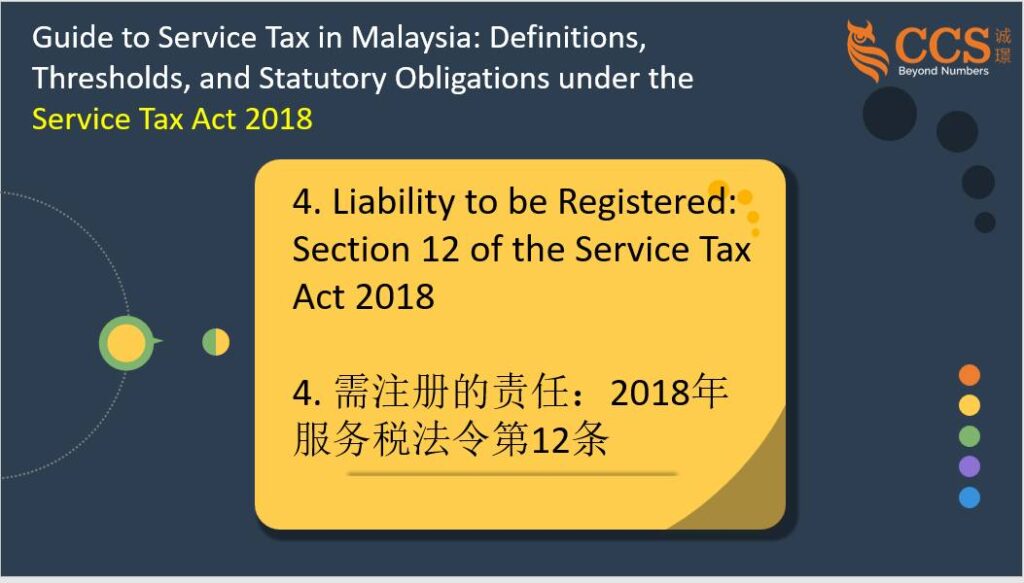
Liability to be Registered: Section 12 of the Service Tax Act 2018
Section 12 of the Service Tax Act 2018, explicitly titled “Liability to be registered,” is a cornerstone of the service tax framework.
It meticulously defines the conditions under which a person providing taxable services becomes legally obligated to register for service tax.
4.1 Interpretation of Section 12(1): Minister’s Authority to Prescribe
Subsection 12(1) grants the Minister of Finance the explicit power to prescribe, through regulations, two critical elements: which specific persons are considered providers of taxable services and the total value of taxable services that would trigger their registration liability.
This ministerial authority is paramount as it provides the necessary flexibility to define the precise scope of registration based on evolving economic realities and policy considerations, ensuring the tax framework remains adaptable.
4.2 Detailed Explanation of Section 12(2): Retrospective and Prospective Threshold Triggers
A person providing taxable services becomes liable to be registered at the earlier of two distinct points in time, as outlined in Section 12(2):
- Retrospective Trigger (Paragraph 12(2)(a)): Liability arises at the end of any given month if the cumulative total value of all their taxable services in that month and the immediately preceding eleven months (thus, a continuous 12-month period) has exceeded the total value prescribed by the Minister.
This is a backward-looking assessment, based on the actual, verifiable performance of the business over the past year. - Prospective Trigger (Paragraph 12(2)(b)): Liability also arises at the end of any month if there are “reasonable grounds to believe” that the total value of all their taxable services in that month and the immediately succeeding eleven months (a forward-looking 12-month period) will exceed the prescribed total value.
This necessitates a proactive and predictive assessment of future revenue, requiring businesses to anticipate their growth trajectory.
The dual retrospective and prospective triggers embedded within Section 12 signify a sophisticated approach to tax enforcement.
This mechanism aims to capture businesses that are either growing rapidly or those that might otherwise attempt to delay registration, thereby effectively broadening the tax net and ensuring earlier collection of tax revenue.
While the historical method provides a standard compliance check based on past performance, the future method is a critical proactive measure.
It means that even if a business has not yet met the threshold based on its past activities, if there is a strong and reasonable expectation of future growth that will push them over the threshold within the next 12 months, they become immediately liable.
This forward-looking aspect is designed to prevent businesses from benefiting from significant taxable service provision without registering and contributing tax until much later, thereby ensuring more timely revenue collection and a wider base of registered taxpayers.
4.3 Analysis of Section 12(3): Minister’s Power for Immediate Registration
Notwithstanding the 12-month assessment periods detailed in subsection (2), Section 12(3) grants the Minister the power to prescribe that any person providing taxable services shall be liable to be registered on the date of the commencement of their business.
This provision allows for immediate registration in specific circumstances, bypassing the revenue-based thresholds.
This power is typically invoked for services deemed critical for immediate oversight or revenue generation, ensuring that certain activities are brought into the tax system from their very inception.
The Minister’s power for immediate registration, when combined with the severe penalties for non-compliance, creates a high-risk environment for businesses that fail to proactively assess their liability.
If a business falls into such a prescribed category and fails to register, it immediately becomes non-compliant.
Given the substantial penalties for failure to register, which can include fines up to RM50,000 and/or imprisonment for up to three years, this provision means businesses cannot afford a “wait and see” approach.
They must understand their service category and potential for immediate liability from the very inception of their operations, making early legal and tax advice paramount.
4.4 Understanding Section 12(4): Disregarding Past Service Value for Re-registration
Subsection 12(4) introduces a specific condition under which the total value of taxable services from the month and the eleven preceding months (as referred to in paragraph 12(2)(a)) can be disregarded for the purpose of re-registration.
This provision applies if a person’s prior registration was cancelled for reasons other than not being liable for registration or ceasing to provide services at the time of initial registration (i.e., a legitimate cancellation).
Furthermore, the Director General must be satisfied that all necessary information was provided by the person before the cancellation.
This subsection introduces a mechanism for fairness in re-registration.
It prevents the unfair re-imposition of tax liability on businesses that legitimately ceased operations or were correctly deregistered, provided they maintained transparency with the authorities throughout the previous deregistration process.
Without this provision, a business that legitimately ceased taxable services and deregistered might immediately become liable for re-registration upon resuming operations, simply because their historical 12-month turnover (from before deregistration) still exceeds the threshold.
By allowing the Director General to disregard this past value under specific conditions of legitimate cancellation and full disclosure, the Act prevents an unfair “tax trap” and encourages transparent compliance throughout a business’s lifecycle.
4. 注册义务:2018年服务税法第12条
2018年服务税法第12条,明确题为“注册义务”,是服务税框架的核心条款。
该条款详细规定了提供应税服务的人员在何种条件下依法必须注册服务税。
4.1 第12(1)条的解释:部长制定规则的权限
第12(1)款明确授予财政部长通过制定法规的权力,规定两项关键要素:哪些特定主体被视为应税服务提供者,以及应税服务总价值达到何种阈值时触发其注册义务。
该部长权限至关重要,因为它提供了必要的灵活性,可根据经济现实和政策考量精确界定注册范围,确保税收框架保持适应性。
4.2 第12(2)条的详细解释:溯及力和前瞻性门槛触发机制
提供应税服务的人员需在以下两个时间点中较早者承担注册义务,具体如下:
溯及力触发机制(第12(2)(a)款): 如果某人在任何一个月的应税服务总价值和前十一个月的应税服务总价值(即连续12个月期间)超过了部长规定的总价值,则其纳税义务在该月结束时产生。
这是基于过去一年实际可核查的业务表现的回顾性评估。- 前瞻性触发条件(第12(2)(b)款):如果存在“合理理由相信”某一月份内所有应税服务的总价值且该月份之后的连续十一个月(即前瞻性12个月期间)的总价值将超过规定的总价值,则责任在该月份结束时产生。
这要求企业进行前瞻性预测,主动评估未来收入,并预判其增长趋势。
第12条中嵌入的双重触发机制(回顾性与前瞻性)体现了税收征管的精细化管理。
该机制旨在捕捉快速增长的企业或可能试图延迟注册的企业,从而有效扩大税基并确保税收收入的及时征缴。
虽然历史方法基于过去表现提供标准合规检查,但未来方法是关键的 proactive 措施。
这意味着,即使企业基于过去活动尚未达到阈值,若存在强有力的合理预期表明未来12个月内将因增长突破阈值,则立即承担纳税义务。
这一前瞻性设计旨在防止企业通过未注册且未缴税的方式享受大量应税服务提供带来的利益,直至多年后才履行纳税义务,从而确保税收收入的及时征收和注册纳税人基数的扩大。
4.3 第12(3)条分析:部长立即注册的权力
尽管第(2)款规定了12个月的评估期,但第12(3)条赋予部长权力,可规定任何提供应税服务的人员应在其业务开始之日立即履行注册义务。
该规定允许在特定情况下绕过收入门槛,实现立即注册。
此权力通常适用于被视为需立即监管或产生税收的关键服务,确保某些活动自其开展之初即纳入税收体系。
部长立即注册的权力,结合未遵守规定的严厉处罚,为未能主动评估自身纳税义务的企业创造了高风险环境。
若企业属于此类规定类别且未注册,将立即成为违规主体。
鉴于未注册的严重处罚,包括最高RM50,000罚款和/或最高三年监禁,该规定意味着企业无法采取“观望”态度。
企业必须从运营初期就明确自身服务类别及潜在即时纳税义务,因此早期法律和税务咨询至关重要。
4.4 理解第12(4)条:重新注册时不考虑过去服务价值
第12(4)款规定了在特定条件下,可不考虑前12个月(包括注册当月)的应税服务总价值(如第12(2)(a)款所指)用于重新注册。
本规定适用于以下情形:个人先前注册被取消的原因并非因不具备注册资格或在初始注册时已停止提供服务(即合法取消注册)。
此外,总干事必须确认该个人在取消注册前已提供所有必要信息。
本款旨在为重新注册引入公平机制。
该规定防止对合法停止经营或正确注销的业务重新课税,前提是该业务在前次注销过程中始终与当局保持透明。
若无此规定,一家合法停止应税服务并注销的企业,在恢复运营时可能立即因历史12个月营业额(注销前)仍超过阈值而被要求重新注册。
通过允许总局长在合法注销且充分披露的情况下忽略此历史值,该法案避免了不公平的“税收陷阱”,并鼓励企业在整个生命周期中保持透明合规。
#看趋势看财税看CCS






